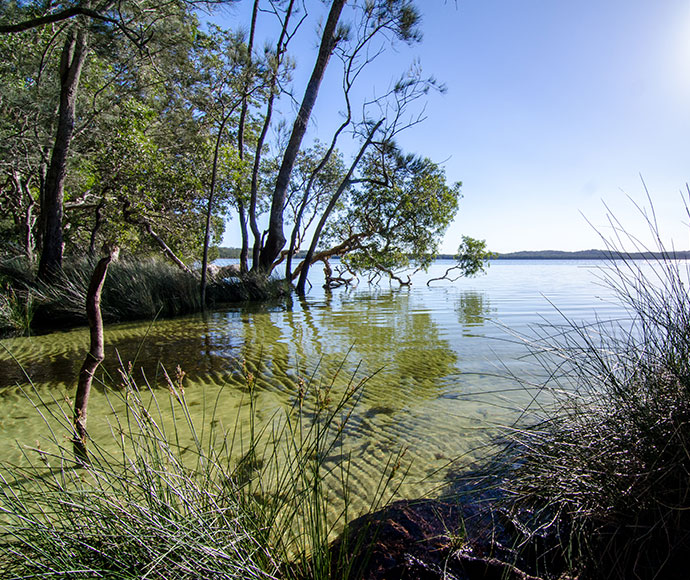The Myall Lakes Ramsar site is 75 kilometres north of Newcastle on the north coast of New South Wales. It covers an area of 44,612 hectares and consists of 5 separate subsites:
- Myall Lakes National Park
- Corrie Island Nature Reserve
- Little Broughton Island Nature Reserve
- part of Gir-um-bit National Park
- part of Port Stephens–Great Lakes Marine Park.

Myall Lakes became a Ramsar site in 1999.
Why these wetlands were listed as a Ramsar site
Countries that sign up to the Ramsar Convention can nominate sites to be listed as Wetlands of International Importance (Ramsar sites). The site must meet at least one of 9 internationally accepted criteria.
The Myall Lakes were listed as a Ramsar site in 1999 because they meet the following criteria.
Criterion 1: Representative or unique wetlands
The Myall Lakes wetlands are a large coastal brackish lake system that are in a near-natural condition.
They are one of the 2 largest brackish-freshwater barrier estuaries in the south east coast drainage division and are an excellent representative example of this wetland type in New South Wales. They contain a unique co-existence of deep and shallow-water macrophytes (a type of aquatic plant) and the organic lake-floor mud known as gyttja.
Criterion 2: Threatened species or ecological communities
The Myall Lakes Ramsar site supports 5 threatened species. These include:
The site also supports the Littoral Rainforest and Coastal Vine Thickets of Eastern Australia, a threatened ecological community under the Environment Protection and Biodiversity Conservation Act 1999.
Criterion 3: Populations of plants and/or animals important for maintaining biodiversity of a particular bioregion
The site supports a rich biodiversity, including over 900 species of plants and more than 400 species of animals. The site regularly supports a substantial number of waterbirds, including 22 migratory species listed under international agreements.
How the site is managed
Management of this Ramsar site is guided by the following:
- the site’s Ramsar information sheet
- its ecological character description
- a plan of management for Myall Lakes National Park, Little Broughton Island Nature Reserve and Stormpetrel Nature Reserves
- a zoning plan for those parts of the Ramsar site within the Port Stephens–Great Lakes Marine Park.
Threats to the Ramsar site
The main threats to this site’s ecological character include:
- nutrient and sediment loads from the catchment
- recreational activities
- aquatic and terrestrial weeds
- climate change.